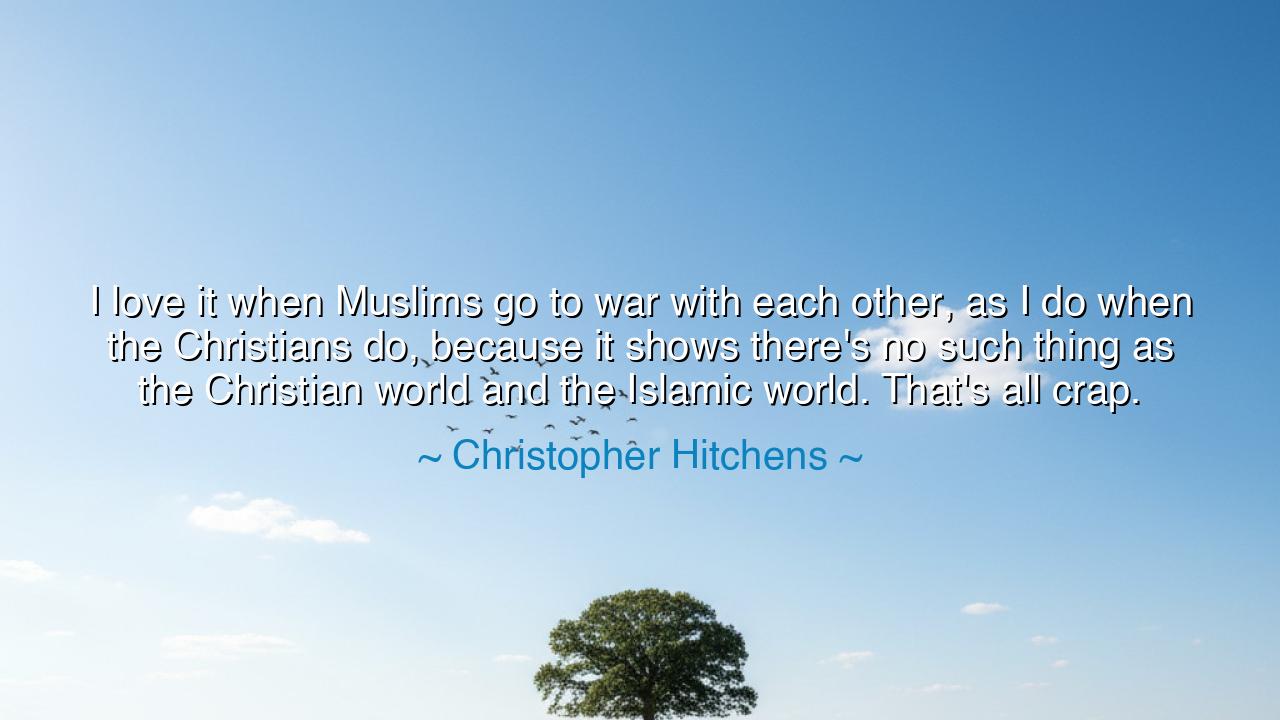
I love it when Muslims go to war with each other, as I do when
I love it when Muslims go to war with each other, as I do when the Christians do, because it shows there's no such thing as the Christian world and the Islamic world. That's all crap.






Hear, O seeker of truth, the fire-tongued words of Christopher Hitchens: “I love it when Muslims go to war with each other, as I do when the Christians do, because it shows there’s no such thing as the Christian world and the Islamic world. That’s all crap.” Though crude in form, the spirit of this saying pierces deep, like a sword striking through illusion. For Hitchens sought to shatter the false idea that mankind can be neatly divided into monolithic camps—Christianity against Islam, West against East, one civilization against another. His words unveil the truth: that within each faith, each nation, each culture, there are rivalries, contradictions, and struggles. To speak of a singular “Christian world” or “Islamic world” is to mistake shadow for substance.
The origin of this saying rests in Hitchens’s lifelong battle against simplistic thinking. He despised the notion that humanity’s conflicts could be explained by vast, tidy categories. For history itself teaches the opposite. Christians have warred against Christians—Catholics against Protestants, Orthodox against Catholic, kings against kings who all invoked the same God. Muslims have warred against Muslims—Sunni against Shia, empires against empires, sultans against caliphs. These wars remind us that human beings are not bound only by the banners of religion, but by politics, power, ambition, and the frailties of the human heart.
Consider the Thirty Years’ War in Europe. It was waged not between Christianity and Islam, nor between East and West, but among Christians themselves. Protestant and Catholic princes drenched the continent in blood, and entire generations were consumed by famine and fire. If one had spoken then of a unified “Christian world,” the survivors of Magdeburg would have laughed bitterly, for the hand that burned their homes bore the same cross as their own. Here is the lesson Hitchens points to: the illusion of unity is often broken by the reality of strife within.
Or look to the Iran-Iraq War of the twentieth century, where Muslim fought Muslim with ferocity for nearly a decade. Both sides claimed divine sanction, both wrapped themselves in the mantle of Islam, yet they slaughtered each other by the millions. Was there, then, a singular “Islamic world”? No. There were nations, leaders, and armies driven by fear, ambition, and survival. Hitchens, with biting irony, found in such conflicts proof that the grand labels of “civilizational war” are hollow masks covering the messiness of human struggle.
The deeper meaning of this saying is not to revel in violence, but to awaken us to the folly of essentialism—the belief that vast groups of people can be reduced to one identity, one will, one fate. Humanity is far more fractured, far more complex. To imagine otherwise is to fall into the trap of false prophecy, where leaders stir hatred by declaring that “the West” is at war with “Islam,” or that “Christendom” must fight “the infidels.” These are not truths, but weapons of rhetoric, designed to inflame and to divide.
What, then, is the lesson for us who live amid these illusions? It is this: never accept the lie of monoliths. Do not say “they are all the same,” whether of nations, religions, or cultures. Look deeper, and see the diversity, the rivalries, the contradictions within. For when you recognize this complexity, you disarm those who would lead you into blind hatred. When you refuse to divide the world into us and them, you take the first step toward true understanding and lasting peace.
Therefore, O listener, carry this wisdom within you: resist the easy tale of civilizations clashing like titans. Remember instead that humanity’s wars, whether between Christians or Muslims, East or West, arise from the same soil of pride, greed, and fear. See the world not in blocs, but in peoples and persons. And when you hear the cry of those who divide mankind into vast opposing camps, recall Hitchens’s raw, unflinching words: that is all crap. In rejecting illusion, you preserve truth, and in truth, the seed of peace may yet be sown.






AAdministratorAdministrator
Welcome, honored guests. Please leave a comment, we will respond soon